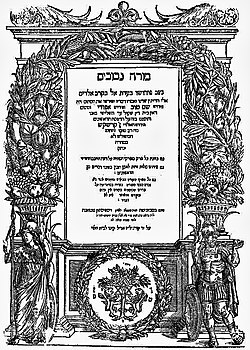
Back مبادئ الإيمان اليهودية Arabic Principis de la fe jueva Catalan Principy víry v judaismu Czech Prinzipien des jüdischen Glaubens German Principoj de kredo en judismo Esperanto Principios judíos de la fe Spanish Principes de foi du judaïsme French עיקרי האמונה היהודית HE Dasar-dasar iman Yahudi ID Principi di fede ebraica Italian
| Part of a series on |
| Jews and Judaism |
|---|
| Part of a series on |
| Jewish philosophy |
|---|
 |
The formulation of principles of faith that are universally recognized by all branches of Judaism remains undefined. There is no central authority in Judaism today—though the Sanhedrin, the supreme Jewish religious court, would fulfill this role if it were re-established. Instead, Judaism's principles of faith remain debated by Jewish religious leadership based on its stakeholders' varied interpretations of the Tanakh, Halakha, and Talmud, which collectively shape its theological and ethical framework. The most accepted version in extent is the opinion of Maimonides.[citation needed]
Maimonides authored a collection of fundamentals that are found in his commentary to the Mishna, the Mishneh Torah. He stresses the importance of believing that there is one single, omniscient, transcendent, non-compound God who created the universe and continues to interact with his creation and judge souls' reward or punishment.
Components of the Maimonidean precepts of Jewish belief are that God created the world from nothingness, the future emergence of the Messiah, and the resurrection of the dead. Also included is the principle that God revealed his laws and 613 mitzvot to the Jewish people in the form of the Written and Oral Torahs. In Rabbinic Judaism, the Torah consists of both the written Torah (Pentateuch) and a tradition of oral law, much of it later codified in the Mishna and Talmud.
© MMXXIII Rich X Search. We shall prevail. All rights reserved. Rich X Search